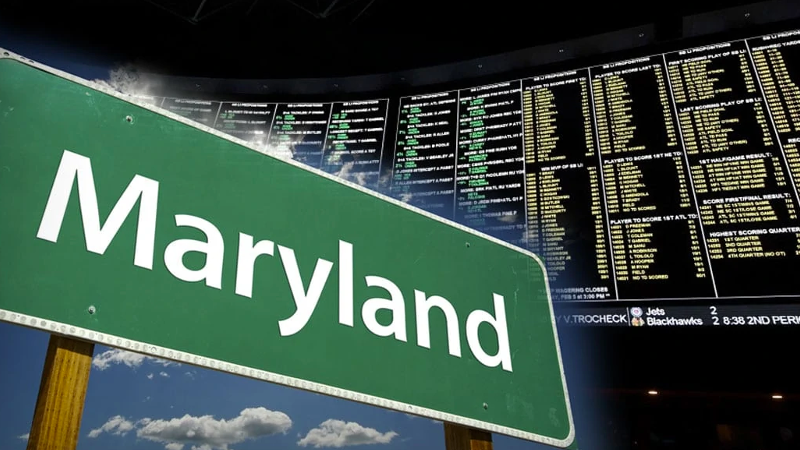In December 2021, Maryland embarked on a transformative journey with the legalization of sports betting, aiming to tap into the burgeoning national interest in sports wagering.
Since its inception, the state has seen remarkable growth, evolving from modest beginnings into a robust market that significantly contributes to public funding and engages a growing base of sports enthusiasts.
The latest reports from Maryland Lottery and Gaming provide valuable insights into the industry’s dynamics, revealing not only the financial benefits but also the evolving preferences and behaviors of bettors within the state.
Historical Context and Current State
Initially, Maryland’s sports betting market started cautiously with a handle of just $16.5 million in December 2021, but it quickly ramped up as operators established their presence and bettors became more engaged.
By the end of 2023, the total betting handle had escalated to over $4.62 billion, a stark contrast to the early days, underscoring the market’s rapid maturation and the effective adaptation of betting platforms to user needs. The state’s regulatory framework and operators’ strategic marketing efforts have played crucial roles in this accelerated growth.

Yearly and Monthly Growth Analysis
2023 was a landmark year with the total handle reaching $4.62 billion, fueled by strategic expansions and the integration of mobile betting platforms, which now dominate the market.
In February 2024 alone, Maryland reported a betting handle of $442.5 million, a 30.4% increase from February 2023. This growth is not isolated to one month but is part of an ongoing upward trend that saw the handle peak at $536.7 million in March 2024, evidencing the market’s strong elasticity and responsiveness to major sporting events.
The fiscal year-to-date figures as of March 2024 illustrate a doubling of the sports betting handle compared to the previous year, surpassing the significant $4 billion threshold. This surge not only reflects the industry’s robust health but also its substantial contribution to Maryland’s public sector initiatives, particularly the Blueprint for Maryland’s Future Fund, which has benefitted from more than $65 million in contributions since the market’s inception.
The Blueprint for Maryland’s Future Fund is a crucial initiative aimed at enhancing educational opportunities throughout Maryland, supported by revenues from the sports betting industry. This funding is vital as it helps improve educational systems, infrastructure, and teacher training, ensuring equitable access to quality education. The contributions from sports betting not only boost educational outcomes but also promote long-term economic and social development across the state.

Operator Dynamics and Market Share
FanDuel and DraftKings have emerged as market leaders, with FanDuel frequently setting new records for handle and revenue.
In March 2024, despite there being 11 active sportsbooks in Maryland, FanDuel alone accounted for nearly half of the total bets placed.
This dominance is challenged by emerging players like BetMGM and ESPN BET, which are vying for a larger slice of the market. Meanwhile, local sportsbooks like Crab Sports are struggling to get a slice of the pie, despite positive reviews and home court advantage.
FanDuel’s recent monopoly in the neighboring D.C. market might also influence Maryland’s betting landscape, potentially diverting or attracting cross-border bettors.

Betting Preferences and Revenue Streams
Basketball remains the premier choice for bettors, with significant action during the NBA season and NCAA tournaments.
However, the diversity in betting is notable, with increasing wagers on less traditional sports like tennis and soccer, reflecting a sophisticated market that caters to varied interests.
The shift in preferences has also impacted revenue streams, where despite fluctuating hold percentages, operators have managed to maintain profitable margins.

Challenges and Opportunities Ahead
While the trajectory is positive, the industry faces challenges such as regulatory adjustments, competition from neighboring states, and the need for technological enhancements to improve user experience. The potential saturation of the market also poses a strategic challenge for operators to innovate continually.
Meanwhile, Maryland recently faced legislative hurdles that stymied the expansion of its gambling industry, particularly concerning the introduction of online casinos.
The Maryland online casino bill, HB 1319, successfully passed the House but encountered significant opposition in the Senate due to concerns about cannibalizing brick-and-mortar casinos and potential increases in gambling addiction.
Despite the state’s success with sports betting, which suggested a promising market for online casinos, the legislative session concluded on April 8 without action on the bill.
This stagnation mirrors a broader trend seen in states like Georgia, indicating a challenging landscape for gambling expansion despite the apparent market potential.

Conclusion
Maryland’s sports betting industry is a testament to strategic growth, substantial economic contributions, and a deepening cultural integration of sports wagering.
This growth has not only enhanced the state’s economic profile through substantial contributions to the Blueprint for Maryland’s Future Fund but has also set the stage for a potential expansion into online casinos, despite current legislative roadblocks.
The success of sports betting illustrates the economic benefits and public interest that can drive legislative changes. However, the recent stagnation in the push for online casino legislation underscores the complexity of expanding gambling frameworks, balancing economic benefits against social concerns like gambling addiction and the impact on existing establishments.
As the market continues to expand and evolve, it offers a compelling case study of the potential and challenges of legalized sports betting in the United States.


